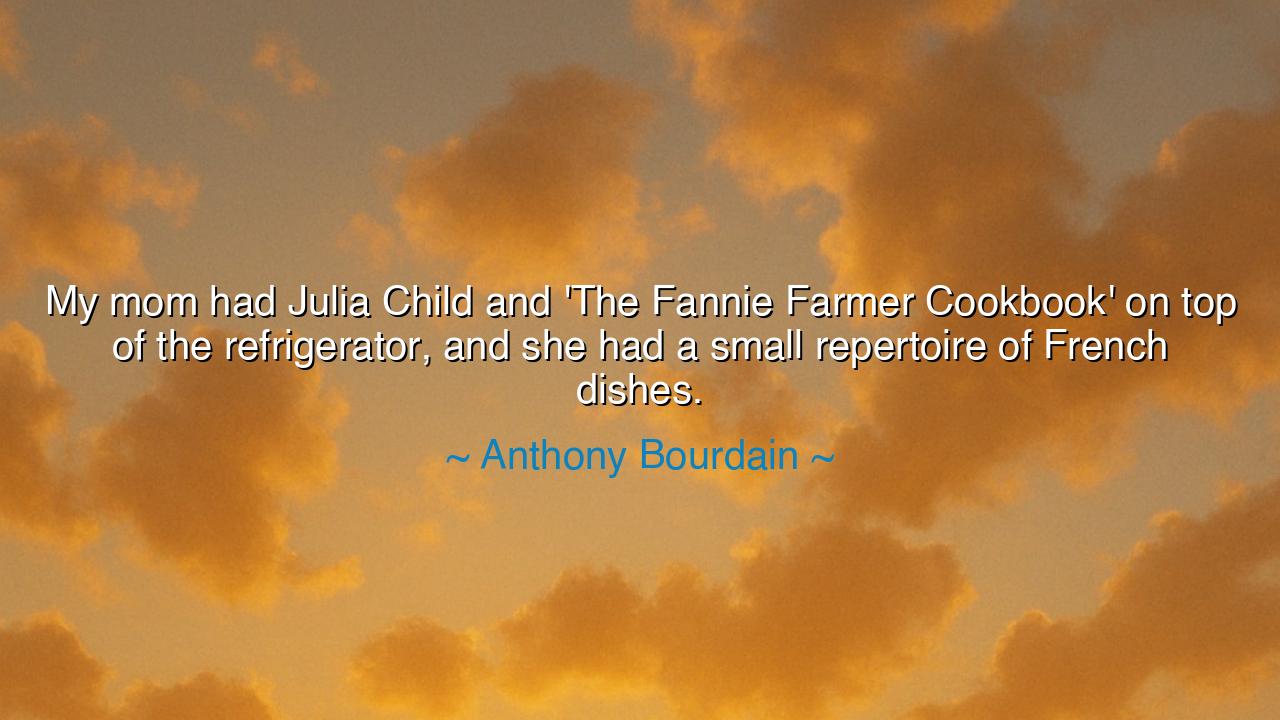
My mom had Julia Child and 'The Fannie Farmer Cookbook' on top of
My mom had Julia Child and 'The Fannie Farmer Cookbook' on top of the refrigerator, and she had a small repertoire of French dishes.






The words of Anthony Bourdain — “My mom had Julia Child and ‘The Fannie Farmer Cookbook’ on top of the refrigerator, and she had a small repertoire of French dishes.” — seem simple, yet within them lies an elegy to heritage, influence, and the birth of passion. In this single sentence, the great traveler and storyteller reveals the quiet origin of a lifelong devotion to food. Behind the clatter of kitchens and the glamour of faraway meals, there is the image of a mother, her cookbooks resting above the refrigerator — symbols of aspiration and imagination — and a young boy absorbing, without knowing, the spirit of culinary adventure that would later define his life.
The mention of Julia Child and The Fannie Farmer Cookbook is not incidental. These names are relics of a specific age — the golden era when cooking in the American home was transforming from a daily chore into an art, a bridge between the familiar and the foreign. Julia Child, the great priestess of French cuisine for the American soul, represented the promise that any kitchen could become a temple of creation. The Fannie Farmer Cookbook, on the other hand, was the scripture of American practicality — precise, measured, traditional. Between the two, Bourdain’s mother held the balance of worlds: art and order, daring and discipline. It was from her kitchen that the young Anthony first glimpsed the alchemy of food — how something as humble as a home recipe could awaken the imagination of a child.
To speak of “a small repertoire of French dishes” is to reveal something essential about the human condition: that greatness often begins in small acts, performed with care. His mother was not a professional chef, but her few dishes — likely coq au vin, quiche Lorraine, or boeuf bourguignon — were acts of cultural reverence, small portals to another world. The ancients understood that beauty often begins in imitation — that through the repetition of small rituals, one learns devotion. Just as a young artist copies the masters before finding his own style, so too did Bourdain grow up among these humble yet reverent gestures toward France — gestures that would later blossom into a global hunger for experience.
History is filled with such beginnings. Consider Leonardo da Vinci, who began his apprenticeship not by creating, but by observing his master Verrocchio, absorbing every brushstroke and motion until the art itself lived in his blood. Or think of Claude Monet, who as a child painted the light on the same small pond over and over again until he learned how to capture eternity within water and reflection. Bourdain’s mother’s kitchen, with its few cookbooks and limited recipes, was his first studio — the quiet stage upon which he learned that the world is vast, and that beauty, if pursued, can be tasted, touched, and shared.
There is a deep tenderness hidden in the memory. For behind every great explorer — of food, of art, of thought — there is often a parent whose quiet curiosity sowed the seed. His mother’s cookbooks were not trophies but beacons, suggesting that even the most ordinary life can aspire toward culture, grace, and depth. She was, unknowingly, the first teacher in his lifelong philosophy: that food is more than sustenance; it is language, memory, and love made tangible.
The origin of his passion, then, was not in restaurants or travel but in home and warmth. The cookbooks atop the refrigerator were both literal and symbolic — slightly out of reach, yet visible enough to inspire. They represented the yearning of a generation that wanted more — not in greed, but in understanding. They whispered, “There is a world beyond your own.” And for a child destined to roam the earth, those books were the first map.
From this reflection, a timeless lesson emerges: great journeys often begin in small rooms. The dreams that shape our lives are rarely born in grandeur, but in the humble gestures of those who raise us — a book, a meal, a sentence spoken in love. Cherish those beginnings, for they are the foundation of destiny. As Bourdain reminds us through his memory, every passion begins with a spark — perhaps as small as a cookbook above the refrigerator — but it is enough to light a lifelong fire.
And so, let this teaching be carried forward: honor the roots of your inspiration. Whether they come from your mother’s kitchen, your father’s workbench, or the stories of those who came before, remember that greatness is not inherited — it is cultivated through attention, gratitude, and the courage to explore what once was only imagined. In that spirit, Bourdain’s mother’s “small repertoire” becomes eternal — a simple, sacred beginning to a life spent discovering the infinite richness of the human table.






AAdministratorAdministrator
Welcome, honored guests. Please leave a comment, we will respond soon